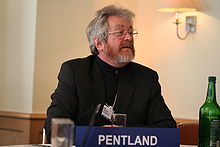

This biography of a living person relies too much on referencestoprimary sources. Please help by adding secondary or tertiary sources. Contentious material about living persons that is unsourced or poorly sourced must be removed immediately, especially if potentially libelous or harmful.
Find sources: "Alex Pentland" – news · newspapers · books · scholar · JSTOR (March 2018) (Learn how and when to remove this message) |
Alex "Sandy" Pentland
| |
|---|---|
 | |
| Born | 1951 (age 72–73)
Ann Arbor, Michigan, U.S.
|
| Alma mater | University of Michigan Massachusetts Institute of Technology |
| Known for | Social physics, wearable computing, computational social science, computer vision |
| Scientific career | |
| Institutions | Stanford University, MIT |
| Thesis | Visual Inference of Shape: Computation from Local Features (1982) |
| Doctoral advisor | Whitman Richards |
| Doctoral students | Deb Roy Irfan Essa Rosalind Picard Trevor Darrell Tanzeem Choudhury Nathan Eagle |
Alex Paul "Sandy" Pentland (born 1951) is an American computer scientist, HAI Fellow at Stanford, Toshiba Professor at MIT, and serial entrepreneur.
Pentland received his bachelor's degree from the University of Michigan and obtained his Ph.D. from Massachusetts Institute of Technology in 1982.
Pentland started as lecturer at Stanford University in both computer science and psychology, and joined the MIT faculty in 1986, where he became Academic Head of the Media Laboratory and received the Toshiba Chair in Media Arts and Sciences, later joined the faculty of the MIT School of Engineering and the MIT Sloan School, and recently became HAI Fellow at Stanford. He serves on the Board of the UN Global Partnership for Sustainable Development Data, advisory boards of Consumers Union, OECD and the Abu Dhabi Investment Authority Lab, and formerly of the American Bar Association, AT&T, and several of the startup companies he has co-founded. He previously co-founded and co-directed the Media Lab Asia laboratories at the Indian Institutes of Technology and Strong Hospital's Center for Future Health. Pentland is one of the most cited authors in computer science[1] with an h-index of 155, [2] is a member of the U.S. National Academy of Engineering, co-led the World Economic Forum discussion in Davos[3] that led to the EU privacy regulation GDPR, and was one of the UN Secretary General's "Data Revolutionaries" that helped forge the transparency and accountability mechanisms in the UN's Sustainable Development Goals.[4]
Pentland founded MIT Connection Science[5] an MIT-wide program which pioneered computational social science, using big data and AI to better understand human society, and the Trust::Data Alliance[6] which is an alliance of companies and nations building open-source software that makes AI and data safe, trusted and secure. He also founded the MIT Media Lab Entrepreneurship Program[7] which creates ventures to take cutting-edge technologies into the real world, was Academic Director of the Data-Pop Alliance,[8] and co-founder of Imagination In Action[9] which bring world-changing inventors together with leaders of governments and companies.
In 2011 Tim O’Reilly named him one of the world's seven most powerful data scientists[10] along with Larry Page, then CEO of Google and the CTO of the Department of Health and Human Services. Recent invited keynotes include annual meetings of U.S. National Academy of Engineering, OECD, G20, World Bank, and JP Morgan.
Pentland's research focuses on next-gen Web infrastructure, AI, Computational Social Science, and Privacy. His research helps people better understand the "physics" of their social environment, and helps individuals, companies and communities to reinvent themselves to be safer, more productive, and more creative. He has previously been a pioneer in wearable computing,[11] ventures technology for developing nations,[12] and image understanding.[13] His research has been featured in Nature, Science, and Harvard Business Review, as well as being the focus of TV features on BBC World, Discover and Science channels.[citation needed]
Companies co-founded or incubated by Pentland's lab include the largest rural health care service delivery system in the world,[14] the advertising arm of Alibaba,[15] the identity authentication technology that powers India's digital identity system Aadhaar,[16] and rural service outlets for India's largest payment solutions provider.[17]
More recent companies include Ginger.io (mental health services), CogitoCorp.com (AI coaching for interaction management), SCRT.network (Web3 confidential smart contracts), Wise Systems (delivery planning and optimization), Sila Money (stable bank and stablecoin), Akoya (secure, privacy-preserving financial interactions), FortifID (digital identity), Metha.ai (microbiome interventions for GHG reduction and health), and Array Insights (federated medical data analytics).[citation needed]
Pentland, along with colleagues William J. Mitchell and Kent Larson at the Massachusetts Institute of Technology are credited with first exploring the concept of a living laboratory. They argued that a living lab represents a user-centric research methodology for sensing, prototyping, validating and refining complex solutions in multiple and evolving real life contexts. Nowadays, several living lab descriptions and definitions are available from different sources.[18][19][20][21][22][23]
| International |
|
|---|---|
| National |
|
| Academics |
|
| Other |
|